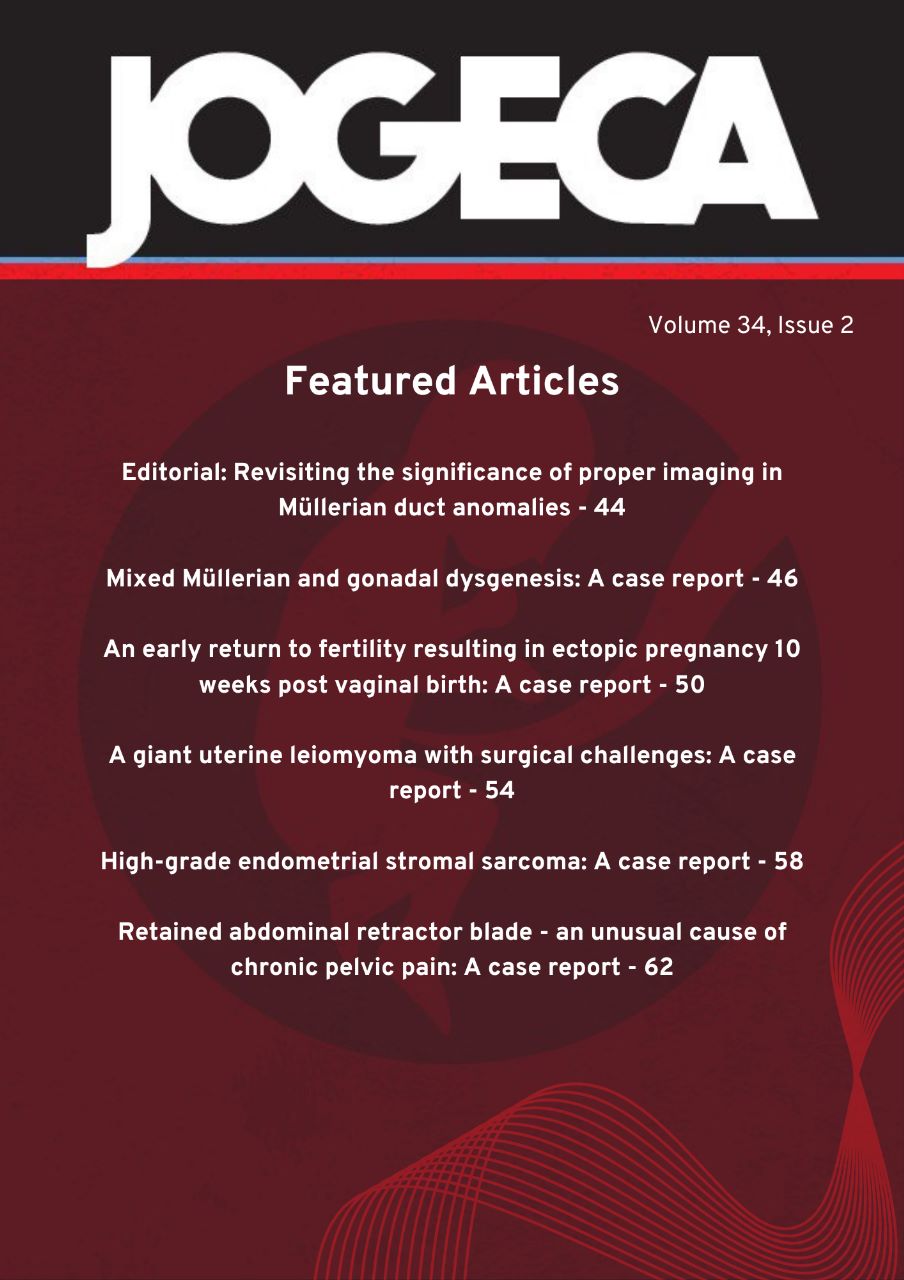Quality of glycemic control and pregnancy outcomes among patients with gestational diabetes at the Kenyatta National Hospital, Kenya
DOI:
https://doi.org/10.59692/jogeca.v33i4.461Keywords:
gestational diabetes, insulin, macrosomia, stillbirths, preterm birthsAbstract
Background: The prevalence of diabetes and gestational diabetes is rising worldwide. If poorly managed, diabetes in pregnancy has a far-reaching negative impact on the mother and newborn.
Objective: To determine the quality of glycemic control and pregnancy outcomes among patients with gestational diabetes in Kenyatta National Hospital, Nairobi, Kenya.
Methods: A retrospective descriptive cohort study design was employed. The study setting was Kenyatta National Hospital, Nairobi, Kenya. The study population was women with diabetes in pregnancy. The study period was May 2011 to November 2019. A sample size of 258 diabetic pregnant patients was reached; 230 and 28 were in the exposed and unexposed groups with the average third trimester fasting blood sugar levels of ≥5.3mmol/L and <5.3mmol/L, respectively. Data were analyzed using the IBM statistical package for social sciences (SPSS) version 23. A p-value of <0.05 was considered statistically significant.
Results: The prevalence of poor glycemic control (average third-trimester fasting blood sugar level ≥5.3mmol/L) was 89.1 . There was a higher % incidence of macrosomia (25.7 vs. 21.4 ; p-value % % 0.627), stillbirths (17.9 vs. 3.6 ; p-value 0.058) % % and preterm birth (43.9 vs. 21.4 ; p-value 0.025) % % among patients with gestational diabetes with poor glycemic control compared to those with good glycemic control. Among mothers with poor glycemic control, the pre-existing diabetes patients experienced significantly worse outcomes of stillbirths (20.9 vs. % 0 ; p-value 0.004) and preterm births (47.2 vs. % % 24.2 ; p-value 0.014) than the gestational diabetes % patients.
Conclusion: Poorly controlled diabetes in pregnancy increases the risk of adverse pregnancy outcomes,
including macrosomia, stillbirths, and preterm births, with the poorly controlled pre-existing diabetic women experiencing significantly worse outcomes of stillbirths and preterm births than the poorly controlled gestational diabetes patients.
References
Hod M, Kapur A, Sacks DA, et al. The International Federation of Gynecology and Obstetrics (FIGO) Initiative on gestational diabetes mellitus: A pragmatic guide for diagnosis, management, and care. Int J Gynaecol Obstet. 2015;131 Suppl 3:S173-S211. doi:10.1016/S0020-7292(15)30033-3
Cho NH, Shaw JE, Karuranga S, et al. IDF Diabetes Atlas: Global estimates of diabetes prevalence for 2017 and projections for 2045. Diabetes Res Clin Pract. 2018;138:271-281. doi:10.1016/j.diabres.2018.02.023
Thomson M. The physiological roles of placental corticotropin releasing hormone in pregnancy and childbirth. J Physiol Biochem. 2013;69(3):559 573. doi:10.1007/s13105-012-0227-2
Nielsen JH. Beta cell adaptation in pregnancy: a tribute to Claes Hellerström. Ups J Med Sci. 2016;121(2):151-154. doi:10.3109/03009734.2016.1165776
Jayabalan N, Nair S, Nuzhat Z, et al. Cross Talk between Adipose Tissue and Placenta in Obese and Gestational Diabetes Mellitus Pregnancies via Exosomes. Front Endocrinol (Lausanne). 2017;8:239. Published 2017 Sep 27. doi:10.3389/fendo.2017.00239
Lowe LP, Metzger BE, Dyer AR, et al. Hyperglycemia and Adverse Pregnancy Outcome (HAPO) Study: associations of maternal A1C and glucose with pregnancy outcomes. Diabetes Care. 2012;35(3):574-580. doi:10.2337/dc11-1687
Athukorala C, Crowther CA, Willson K; Austrailian Carbohydrate Intolerance Study in Pregnant Women (ACHOIS) Trial Group. Women with gestational diabetes mellitus in the ACHOIS trial: risk factors for shoulder dystocia. Aust N Z J Obstet Gynaecol. 2007;47(1):37-41. doi:10.1111/j.1479-828X.2006.00676.x
HAPO Study Cooperative Research Group, Metzger BE, Lowe LP, et al. Hyperglycemia and adverse pregnancy outcomes. N Engl J Med.2008;358(19):1991-2002. doi:10.1056/NEJMoa0707943
Campbell S. Fetal macrosomia: a problem in need of a policy. Ultrasound Obstet Gynecol. 2014;43(1):3-10. doi:10.1002/uog.13268
Poolsup N, Suksomboon N, Amin M. Effect of treatment of gestational diabetes mellitus: a systematic review and meta-analysis. PLoS One. 2014;9(3):e92485. Published 2014 Mar 21. doi:10.1371/journal.pone.0092485
Cheung NW, Oats JJ, McIntyre HD. Australian carbohydrate intolerance study in pregnant women: implications for the management of gestational diabetes. Aust N Z J Obstet Gynaecol. 2005;45(6):484-485. doi:10.1111/j.1479- 828X.2005.00481.x
Ministry of Health. Guidelines for the screening and management of Diabetic Retinopathy in Kenya Guidelines for Screening and Management of Diabetic Retinopathy MINI REPUBLIC OF KENYA STRY OF HEALTH [Internet]. [cited 2021 Sep 10]. Available from: http://www.health.go.ke/wp-content/uploads/2017 /11/Guidelines-for-Screening-and-Management- of-Diabetic-Retinopathy-in-Kenya.pdf
Calderon IMP, Damasceno DC, AMorin RL, Costa RAA, Brasil MAM, Rudge MVC. Morphometric study of placental villi and vessels in women with mild hyperglycemia or gestational or overt diabetes. Diabetes Res Clin Pract. 2007;78:65–71.
Buhary BM, Almohareb O, Aljohani N, et al. Glycemic control and pregnancy outcomes in patients with diabetes in pregnancy: A retrospective study. Indian J Endocrinol Metab. 2016;20(4):481-490. doi:10.4103/2230- 8210.183478
Nakabuye B, Bahendeka S, Byaruhanga R. Prevalence of hyperglycaemia first detected during pregnancy and subsequent obstetric outcomes at St. Francis Hospital Nsambya. BMC Res Notes. 2017;10(1):174. Published 2017 May 2. doi:10.1186/s13104-017-2493-0
Sweeting AN, Ross GP, Hyett J, et al. Gestational Diabetes Mellitus in Early Pregnancy: Evidence for Poor Pregnancy Outcomes Despite Treatment. Diabetes Care. 2016;39(1):75-81. doi:10.2337/dc15-0433
Djomhou M, Sobngwi E, Noubiap JJ, Essouma M, Nana P, Fomulu NJ. Maternal hyperglycemia during labor and related immediate post-partum maternal and perinatal outcomes at the Yaoundé Central Hospital, Cameroon. J Health Popul Nutr. 2016;35(1):28. Published 2016 Aug 22. doi:10.1186/s41043-016-0065-x
Downloads
Published
How to Cite
Issue
Section
Categories
License
Copyright (c) 2021 The Authors.

This work is licensed under a Creative Commons Attribution 4.0 International License.




